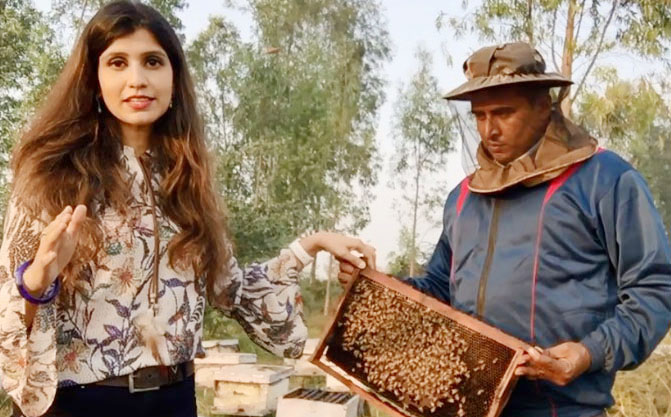Kanupriya Saigal- not only looks smart but is also determined to accomplish her aims. She has vowed to change the lives of beekeepers in parts of Punjab and Haryana by organizing them in a cooperative and training them in modern techniques of bee-keeping.
Her plans are simple yet revolutionary. With a modest initial capital of just Rs 2-5 lakh one can harvest fifty hives and earn Rs 10 thousand per month.
Honey sells at a low rate but she talks of other products that are possible from this such as jelly. Ninety products are possible from honey, she claims and dreams of setting up a Centre of Excellence for bee-keeping in the near future.
Her idea of bee-keeping in modern ways won the awards at IIT Delhi which is now supporting her project. An ex-NDTV staffer Kanupriya had a long stint in agri companies where she learnt the tricks of the trade.
”The good thing is beehives multiply very fast; it grows by almost 80 per cent in a year and you do not need additional land for it,” she says explaining the mathematics of the business.
The bank readily gives 40 percent of the loan which a bee-keeper can return at ease in installments. If you set up beehive in December you may have a first crop by late January or early February, said Kanupriya underlining these months as the best season for beekeeping.
She has been able to make a network of 500 farmers in Haryana and about 300 in Punjab. Her foundation known as
She lamented, however, the lack of certification from the govt. There are a number of farmers producing honey and they all want to have a brand of their own. This needs to change and the govt has to play a role here, she added.
Her ultimate dream is to have the Amul kind of model which collects milk from various farmers but standardizes it into Amul brand. ”We wish to be Amul in th the field of honey and related products”, she said.
Her hope stands on the facts of growing honey market in the world. Ninety percent of what we produce in India is exported and the market is growing at the rate of 30 to 40 per cent. There is huge scope, she said knowing well that the marketing of product is perhaps the biggest challenge in the game.
